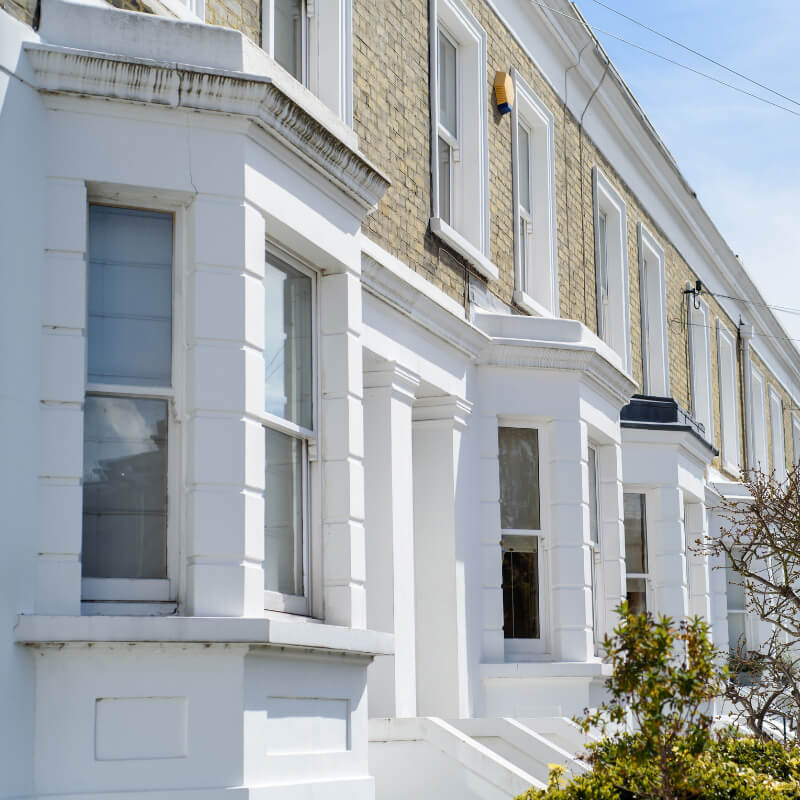Investing in residential property away from your own home
Property has traditionally been a good investment. Prices have risen over the longer term and this is likely to continue.
However, most people’s investment in residential property lies in buying a house and living in it.
But that doesn’t generate any income – unless you take in a lodger – and any capital gain is likely to go towards buying your next house.
Otherwise, it was a form of investment that was limited to professional builders or to people who had enough capital to buy a property purely as a form of investment. In recent years, however, people have been taking the opportunities presented by a number of ways to invest in the UK’s booming residential property market - and the following are seven of the most popular.
1. DIY / direct purchase
For many people, a route to making money in the housing market has been by buying a property, improving it and then selling it on for a profit. A lot of people have done this successfully over the years, making good money and often going on to repeat the process.
However, success depends on a number of factors. Most fundamentally, the profitability of the venture demands that you don’t spend more on improving the property than you can recoup in the higher price you can sell it for.
Similarly, it's key to ensure you bought the property in the first place at a good price – namely one that was below the market rate. It’s an old adage of property investing professionals that you make your profit on a house when you buy it, not when you sell it.
So, buying a house and 'doing it up' is a time honoured way of making money in the property market, but it does call for some specialist skills and knowledge. You need skills in trades such as building, joining, plumbing, wiring and decorating – or, at the very least, you need to know people who have.
You also need a good knowledge of the local property market: what is a fair price, where are prices rising, where have they peaked and where are they likely to rise in the future?
2. Buy-to-Let
Buy-to-Let was the way to make money through property in the 1990s. In fact, for many it was the way to make money full stop. This is hardly surprising, as for years it was a one-way bet. Soaring property values combined with low interest rates seemed like a licence to print money.
Renting out a property brought in a regular decent income from a property that was also clocking up a healthy capital gain month by month. The low interest rates and generous mortgage terms meant that financing costs could comfortably be covered.
Read more: with buy-to-let tax reliefs going, what are your property investor options?
However, the government, deciding that a runaway buy-to-let sector was distorting the housing market, put the brakes on with a stamp duty hike, restricted tax relief on interest payments and tighter regulation on mortgages.
Property expert Savills in its Residential Property Forecasts for Autumn 2018 points out that mortgaged buy to let market purchases have fallen by 43% in the past two years and highly geared investors are refocusing on lower-value, higher-yielding locations.
Undoubtedly affecting the buy-to-let market, it's in no way dead and an investment into the right house, in the right location - often at both extremes of the housing market - can still prove lucrative.
3. Holiday Let
Related to buy-to-let are holiday lets. If you buy a property in a popular holiday location - the Lake District and the Yorkshire Dales are popular spots here in the north - you can rent it out to holidaymakers. You’re likely to be able to charge higher rents than for conventional buy-to-let, but, then again, the property will likely be more expensive, so the yield will not necessarily be higher.
This form of investment is even more hands-on than standard buy-to-let, as to ensure a steady supply of short term tenants, you have to market the property, you need to provide cleaners between each occupancy, arrange for keys handover and you have to ensure provision for maintenance and repair – often at short notice. Your business will also, to an extent, be at the mercy of the vagaries of the British climate.
But as with traditional buy-to-let, it's still an appealing proposition - and a portfolio of holiday lets could very realistically be particularly lucrative.
4. Buying shares in housebuilders
A simple way to invest in the UK property market, without going to the trouble of direct involvement in house-building, is by buying shares in a housebuilding company listed on the stock exchange.
Shares in a company such as Bellway, Barratt or Talyor Wimpey would allow you to benefit from the UK housing market in a comparatively low risk way and you can easily end your involvement at any time of your choosing by selling your shares.
You would not, however, have the satisfaction of direct involvement in a development project and you’re unlikely to benefit from the kinds of returns available through other ways of investing.
5. Investing in property funds
If you don’t want feel knowledgeable enough to select individual property company shares yourself, you could look at a property fund, which invests in the shares of the companies that operate in the sector.
Most of these focus on offices and retail space where rental yield tends to be higher, but you’ll be missing out on the capital gains available in buy-to-let residential housing. This is an even more indirect way of sharing in the property market than buying your own shares.
You might also buy shares in a Real Estate Investment Trust (REIT). REITs have been around in the UK for about 10 years and most of the UK’s largest property companies have converted to REITs, including big names such as British Land and Land Securities.
REITs are limited companies and this means that they escape much of the tax on residential lettings. But, to qualify as a REIT, at least 75% of profits must come from property rental, and 75% of the company’s assets must be involved in the property rental business. REITs must also pay out 90% of their rental income to investors.
Buying shares in building companies or REITs is relatively safe way to invest in residential property, but again, it’s unlikely to generate the same levels of return that a more direct participation in the market can bring. Nor does it give the same sense of having a direct involvement in a development.
6. Property bonds
Property bonds are corporate bonds issued by a company to fund property projects, which could be specified at the time of issue, or the cash raised can be used to fund a portfolio of developments over time. The bonds are secured against the properties invested in.
Bonds are a fixed-income investment. The investor lends the face value of the bond to the issuer, which will be repaid when the bond matures. Each bond also specifies a fixed interest rate, known as the coupon, and the interest can be paid to the bond holder at regular intervals throughout the bond’s lifetime, or it can be rolled up to be paid in addition to the face value of the bond at maturity.
With new internet-based lending platforms, ordinary investors can invest much smaller amounts in property bonds than was traditionally possible. Property bonds specifically allow people to invest in the residential property market, for a fixed rate of return, which usually compares favourably to other investments - and particularly as an alternative to traditional savings accounts - without committing large amounts of capital.
7. Investing alongside the builder in a joint venture
In recent years online platforms have been developed which allow large numbers of investors to invest together through crowdfunding. Now investors seeking a decent return on their cash can come together with developers and builders looking for funding.
With a refinement of crowdfunding being co-investment, this is where ordinary investors can invest alongside professionals such as business angels, institutions and growth funds, and – in the context of residential property – alongside builders and developers. This can gives them the comfort that deals have been professionally vetted.
Read more: Is joint venture investing the best way to get into property investing?
These platforms are now being used to fund property developments through joint venture agreements (JVAs), a temporary, formalised partnership of builders, finance houses and developers. A Special Purpose Vehicle (SPV) is created under the JVA, as a limited company in which the investors buy shares. The money they invest can only be used on a specific development.
This allows the investor to share directly in the returns available in the housing market. If the houses sell for more than forecast, then the return for investors will be higher, because the cash returned to an investor as a percentage of the profit achieved matches the proportion of equity they hold. If an investor holds 10% of the shares in the SPV, they will be entitled to 10% of the profit (and importantly, potential losses are limited to the amount invested).
Investors have the comfort of investing alongside property and investment experts and the security of having an asset-backed investment. The time frames for a return – typically 18 months to two years – are short relative to the possible returns. As little as £1,000 can be invested in a single project, allowing the investors to spread their capital among a number of developments and so mitigate their risk.
Investing in residential property
The residential property market is arguably more accessible today than it has been. There are more opportunities, more routes to entry and a greater amount of information available to help you in the decision making process.
With house prices forecast to continue to rise, no one can say for certain whether any investment will be a success, but it seems more investors than ever are backing the UK's residential property market.
%20(3)%20(2).jpg)









